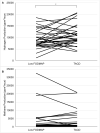Randomised clinical trial: gut microbiome biomarkers are associated with clinical response to a low FODMAP diet in children with the irritable bowel syndrome
- PMID: 26104013
- PMCID: PMC4514898
- DOI: 10.1111/apt.13286
Randomised clinical trial: gut microbiome biomarkers are associated with clinical response to a low FODMAP diet in children with the irritable bowel syndrome
Abstract
Background: A low fermentable oligosaccharides, disaccharides, monosaccharides and polyols (FODMAP) diet can ameliorate symptoms in adult irritable bowel syndrome (IBS) within 48 h.
Aim: To determine the efficacy of a low FODMAP diet in childhood IBS and whether gut microbial composition and/or metabolic capacity are associated with its efficacy.
Methods: In a double-blind, crossover trial, children with Rome III IBS completed a 1-week baseline period. They then were randomised to a low FODMAP diet or typical American childhood diet (TACD), followed by a 5-day washout period before crossing over to the other diet. GI symptoms were assessed with abdominal pain frequency being the primary outcome. Baseline gut microbial composition (16S rRNA sequencing) and metabolic capacity (PICRUSt) were determined. Metagenomic biomarker discovery (LEfSe) compared Responders (≥50% decrease in abdominal pain frequency on low FODMAP diet only) vs. Nonresponders (no improvement during either intervention).
Results: Thirty-three children completed the study. Less abdominal pain occurred during the low FODMAP diet vs. TACD [1.1 ± 0.2 (SEM) episodes/day vs. 1.7 ± 0.4, P < 0.05]. Compared to baseline (1.4 ± 0.2), children had fewer daily abdominal pain episodes during the low FODMAP diet (P < 0.01) but more episodes during the TACD (P < 0.01). Responders were enriched at baseline in taxa with known greater saccharolytic metabolic capacity (e.g. Bacteroides, Ruminococcaceae, Faecalibacterium prausnitzii) and three Kyoto Encyclopedia of Genes and Genomes orthologues, of which two relate to carbohydrate metabolism.
Conclusions: In childhood IBS, a low FODMAP diet decreases abdominal pain frequency. Gut microbiome biomarkers may be associated with low FODMAP diet efficacy. ClinicalTrials.gov identifier: NCT01339117.
© 2015 John Wiley & Sons Ltd.
Figures


Comment in
-
Editorial: predicting response to a low FODMAP diet in children.Aliment Pharmacol Ther. 2015 Sep;42(6):775-6. doi: 10.1111/apt.13332. Aliment Pharmacol Ther. 2015. PMID: 26278561 No abstract available.
-
Editorial: predicting response to a low FODMAP diet in children--authors' reply.Aliment Pharmacol Ther. 2015 Sep;42(6):776. doi: 10.1111/apt.13336. Aliment Pharmacol Ther. 2015. PMID: 26278562 Free PMC article. No abstract available.
-
Letter: avoid FODMAPs or follow simple tips?Aliment Pharmacol Ther. 2015 Dec;42(11-12):1329. doi: 10.1111/apt.13391. Aliment Pharmacol Ther. 2015. PMID: 26510542 No abstract available.
-
Letter: avoid FODMAPs or follow simple tips--authors' reply.Aliment Pharmacol Ther. 2015 Dec;42(11-12):1330. doi: 10.1111/apt.13420. Aliment Pharmacol Ther. 2015. PMID: 26510543 Free PMC article. No abstract available.
Similar articles
-
Does Fibre-fix provided to people with irritable bowel syndrome who are consuming a low FODMAP diet improve their gut health, gut microbiome, sleep and mental health? A double-blinded, randomised controlled trial.BMJ Open Gastroenterol. 2020 Aug;7(1):e000448. doi: 10.1136/bmjgast-2020-000448. BMJ Open Gastroenterol. 2020. PMID: 32816830 Free PMC article. Clinical Trial.
-
A Randomized Controlled Trial Comparing the Low FODMAP Diet vs. Modified NICE Guidelines in US Adults with IBS-D.Am J Gastroenterol. 2016 Dec;111(12):1824-1832. doi: 10.1038/ajg.2016.434. Epub 2016 Oct 11. Am J Gastroenterol. 2016. PMID: 27725652 Clinical Trial.
-
Gastrointestinal tolerance of low FODMAP oral nutrition supplements in healthy human subjects: a randomized controlled trial.Nutr J. 2017 May 25;16(1):35. doi: 10.1186/s12937-017-0256-3. Nutr J. 2017. PMID: 28545589 Free PMC article. Clinical Trial.
-
The gut microbiome as a predictor of low fermentable oligosaccharides disaccharides monosaccharides and polyols diet efficacy in functional bowel disorders.Curr Opin Gastroenterol. 2020 Mar;36(2):147-154. doi: 10.1097/MOG.0000000000000608. Curr Opin Gastroenterol. 2020. PMID: 31850930 Free PMC article. Review.
-
Altered gastrointestinal microbiota in irritable bowel syndrome and its modification by diet: probiotics, prebiotics and the low FODMAP diet.Proc Nutr Soc. 2016 Aug;75(3):306-18. doi: 10.1017/S0029665116000021. Epub 2016 Feb 24. Proc Nutr Soc. 2016. PMID: 26908093 Review.
Cited by
-
The Role of the FODMAP Diet in IBS.Nutrients. 2024 Jan 26;16(3):370. doi: 10.3390/nu16030370. Nutrients. 2024. PMID: 38337655 Free PMC article. Review.
-
Gut microbial response to host metabolic phenotypes.Front Nutr. 2022 Nov 7;9:1019430. doi: 10.3389/fnut.2022.1019430. eCollection 2022. Front Nutr. 2022. PMID: 36419554 Free PMC article. Review.
-
Update on Dietary Management of Childhood Functional Abdominal Pain Disorders.Gastroenterol Clin North Am. 2018 Dec;47(4):715-726. doi: 10.1016/j.gtc.2018.07.001. Epub 2018 Sep 28. Gastroenterol Clin North Am. 2018. PMID: 30337028 Free PMC article. Review.
-
The gut microbiome and irritable bowel syndrome.F1000Res. 2018 Jul 9;7:F1000 Faculty Rev-1029. doi: 10.12688/f1000research.14592.1. eCollection 2018. F1000Res. 2018. PMID: 30026921 Free PMC article. Review.
-
Metabolomics enables precision medicine: "A White Paper, Community Perspective".Metabolomics. 2016;12(10):149. doi: 10.1007/s11306-016-1094-6. Epub 2016 Sep 2. Metabolomics. 2016. PMID: 27642271 Free PMC article.
References
-
- Barr RG, Levine MD, Watkins JB. Recurrent abdominal pain of childhood due to lactose intolerance. N Engl J Med. 1979;300(26):1449–52. - PubMed
-
- Dainese R, Casellas F, Marine-Barjoan E, et al. Perception of lactose intolerance in irritable bowel syndrome patients. Eur J Gastroenterol Hepatol. 2014;26(10):1167–75. - PubMed
